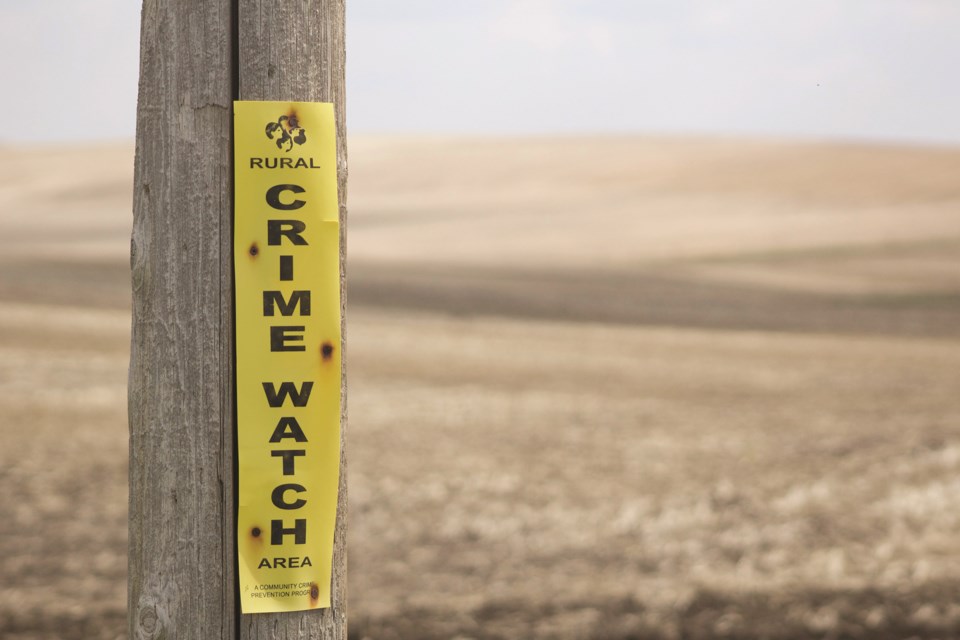As rural crime remains high, a new legislative motion to train civilians to assist police may offer a new direction for local crime watch units.
The United Conservative Party (UCP) motion introduced June 22 by MLA Todd Loewen urged the Alberta government to explore the idea of a voluntary civilian corps.
Aimee Szarka, former president of Langdon Citizens on Patrol, praised the motion. According to Szarka, crime rates have increased in her community in the last few years and something more needs to be done.
“The police can’t come quickly enough and somebody will come in and steal someone's truck, and two weeks later the same guy will come back and steal that person's trailer,” she said. “I think giving people the ability to contribute will help lower the risk because there’s frustration and anger and that can also increase the risk.”
According to Loewen, the motion was created to address high rates of rural crime – a problem he said is a major concern in his constituency of Central Peace-Notley.
A 2017 Statistics Canada report showed rural crime rates in Alberta are 38 per cent higher than in urban areas.
While putting forward the motion in the legislature, Loewen addressed police response time to rural areas, stating some of his constituents are 30 to 45 minutes away from the nearest police detachment.
"Criminals will brazenly enter a farm or an oil or other industrial site and take anything and everything they can get their hands on," Loewen said. "[They’ll] be long gone before local RCMP are able to answer the call."
The civilian corps would not be a paid group that would take over for the police, nor would it be a form of vigilante justice, Loewen emphasized. The volunteers would be unarmed, would not respond to 911 calls and they would report directly to local police.
“In most of Alberta, when you call the fire department, you get trained volunteer firefighters made up of members of your community. The same with Search and Rescue [Alberta],” Loewen said in an email to Rocky View Weekly. “This voluntary civilian corps could also help these other first responders stay focused on the tasks they were specifically trained for.”
The voluntary civilian corps would be organized, screened and trained by local law enforcement, Loewen said, and build on associations already in place like Rural Crime Watch and Citizens on Patrol.
Rosemary Lindsay, president of Cochrane Foothills Protective Association Rural Crime Watch, said her organization encourages members of the public to observe, record and report anything suspicious. Though unsure about Loewen’s motion, she said she was interested to see how a voluntary civilian corps could fit into this practice.
“We always encourage citizens to never act in the capacity of a police officer,” she said. “One of the most valuable tools you have is the camera on your phone. When you’re observing something, grab two pictures because then you’ve got documented evidence...and you can do this from a safe distance.”
New Democratic Party (NDP) MLA Rod Loyola was opposed to the motion and questioned its safety. Referencing calls by peace officers for more protection after the 2012 death of peace officer Rod Lazenby – who was attacked on a rural property in the Foothills district in Southern Alberta while on his way to investigate a dog complaint – Loyola said the motion could put the citizens involved at risk.
Szarka said she believes the safety argument is unfair.
“People that live in rural communities are already at risk...and some changes need to be made,” Szarka said. “I think having proper co-ordination, proper education and proper training can only lower the risks that are already out there.”
Loyola also questioned the urgency of exploring a civilian corps during worldwide conversations about police brutality, stating he thought it was an "insensitive call for action" when it is "so clear that politicians need to listen more."
"I believe emphasizing the need for police to be trained to de-escalate situations is of urgent, urgent importance," he said. "I cannot say the same for the calls of this motion."
According to Loewen, should the Minister of Justice choose to act on the motion, additional research and consultation would be required. However, it could be a great way for communities to have a direct line to police so their “unique perspectives could be recognized.”
The motion was passed with 28 members of the UCP in favour and six members of the NDP against. Because the motion is a non-government initiative, it is ultimately up to the minister to decide on the next steps, Loewen said.
Kate Mackenzie, AirdrieToday.com
Follow me on Twitter @katefmack



